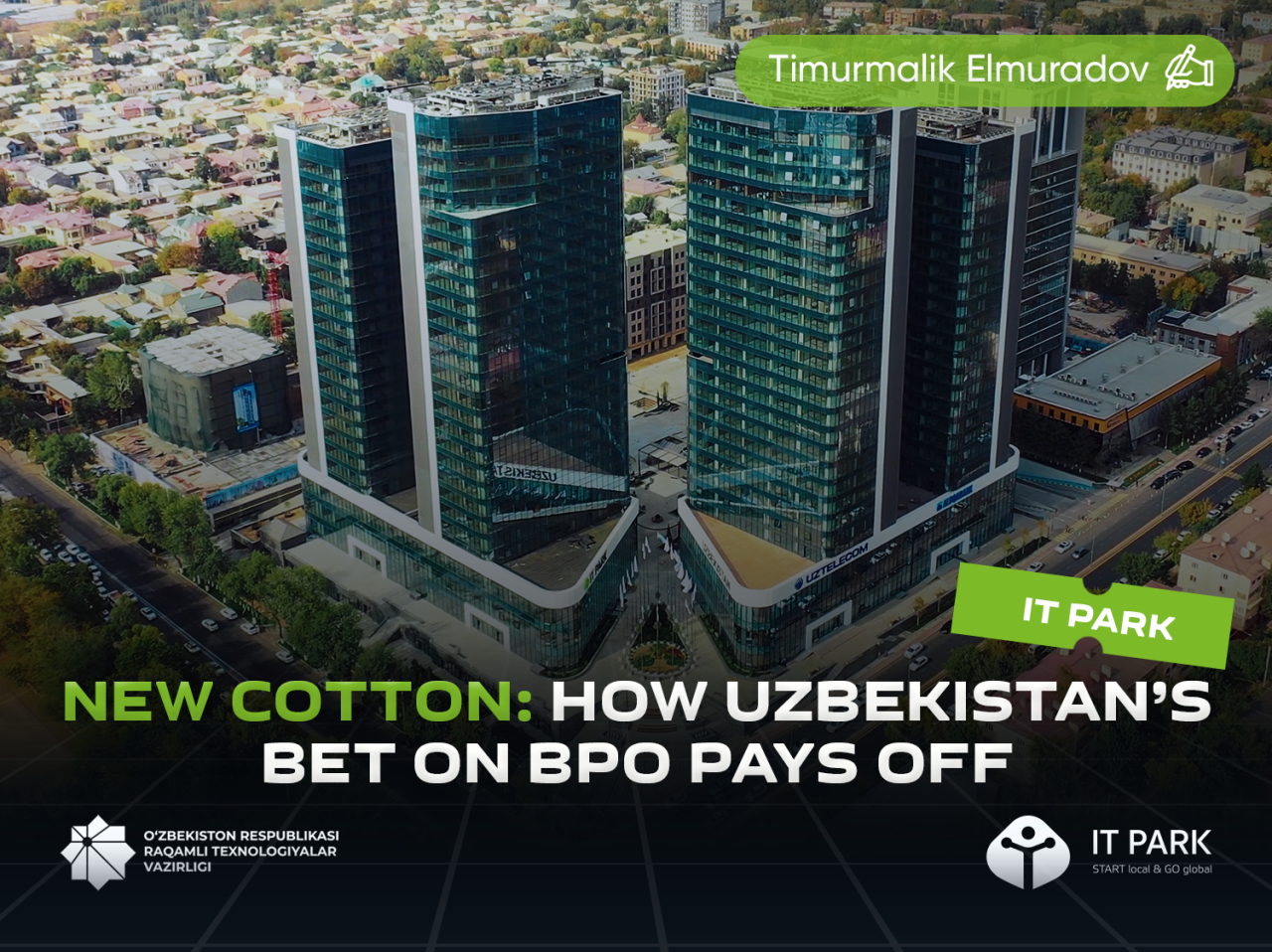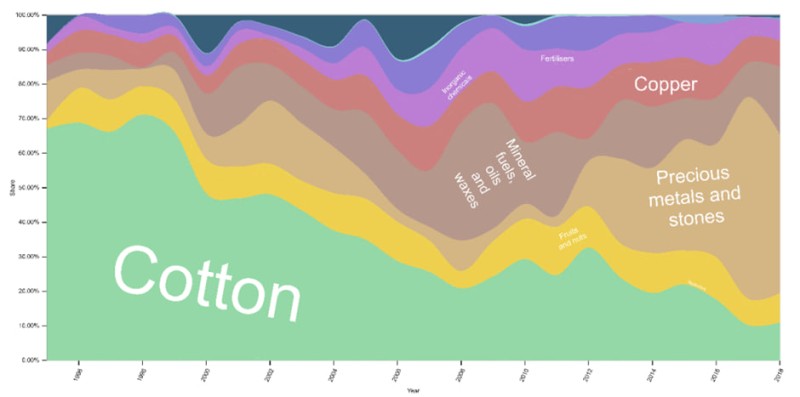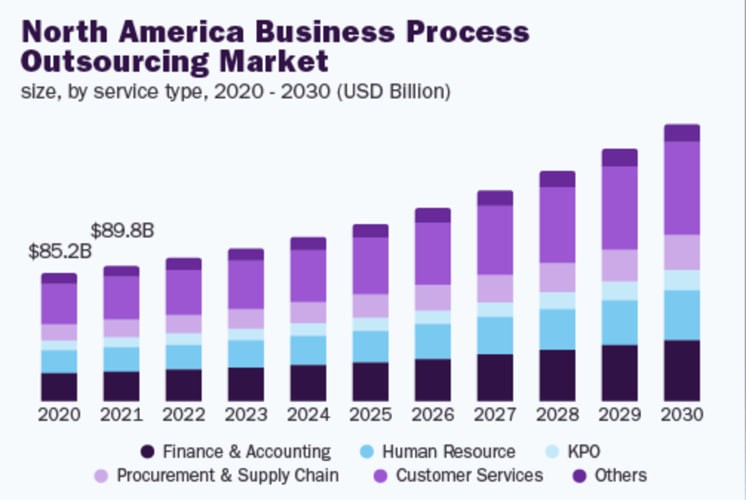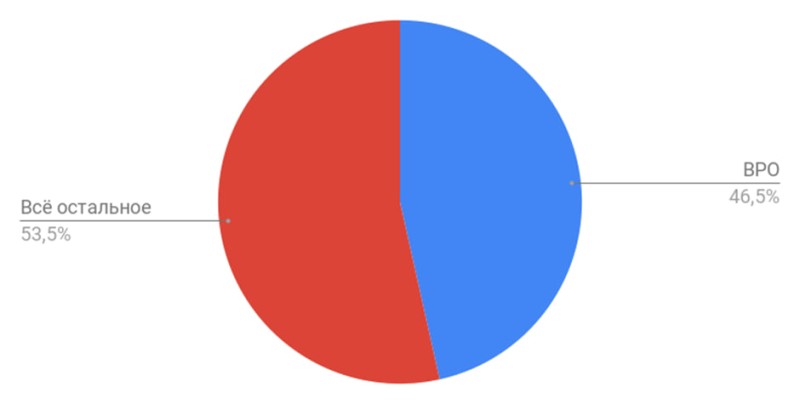
New cotton: How Uzbekistan’s bet on BPO pays off
Several countries are associated with certain goods. Brazil, for instance, produces coffee beans, Ecuador, bananas, and Indonesia, coconuts.
This is typically because these nations are the major producers of those goods.
Uzbekistan has never been a leader in cotton exports, but foreigners often think of it when they hear its name.
This can be explained by the fact that until relatively recently cotton was the primary good the republic exported to other countries (hitting absurd 70%):

Sectoral composition of exports, Uzbekistan, 1995-2018
Source: The Second Systematic Country Diagnostic for Uzbekistan, World Bank
Although cotton’s percentage has been falling in recent years and is now less than 10%, the association has persisted.
This could soon change, though, as Uzbekistan transitions from an agricultural to a post-industrial state.
Along this path, BPO could become the nation’s new trademark in foreign marketplaces. The procedure is already underway.
The global BPO market is worth hundreds of billions of dollars and continues to grow
Outsourcing appeared in the middle of the 20th century, when companies realized that it was cheaper and easier to outsource some tasks.
IT outsourcing emerged in the 1980s. The first case was Kodak, which, instead of running the data center itself, simply outsourced it to IBM.
In the early years, there was only outsourcing of tasks, where one company would involve another for a specific project with a clear deadline.
In the future, companies began to give other companies entire areas of business. This is how business process outsourcing (BPO) was born.
The BPO market is anticipated to reach $261.9 billion by 2023. It is predicted that figures will hit $525.2 billion by 2031.
The market will focus around customer service (30%) that mainly includes support services and call centers.
Furthermore, outsourcing of logistics, human resources, data processing, procurement, marketing, and accounting is equally popular.
All those areas that can be transferred to another company without detriment to the core business.
The main market is North America:

North American BPO Market Volume Dynamics
Source: Grand View Research
There is a demand for BPO services of Uzbekistan across the world that continues increasing as well
The first BPO companies in Uzbekistan appeared in the mid-2000s, but a sharp growth began only in recent years.
What started as success stories of a few businesses finding a niche in the US logistics market is now developing into a separate sector.
Therefore, in 2021, if there were only 45 companies functioning, a year later, their number increased to 164. In 2022, 17 new BPO centers were established, employing 450 professionals.
Due to this, BPO services contributed $65.1 million of the 140 million dollars’ worth of IT services exported last year:

The main buyer is the USA. In North America, where the demand for BPO is the highest in the world, is expected to grow further.
That partly answers to whether the bet on BPO paid off when few years ago business process outsourcing companies were allowed to be residents of IT Park.
The measures taken make such companies eligible for:
● equipped office;
● complete exemption from all types of taxes and customs payments;
● reduction of the personal income tax rate — 7.5%;
● reduction of tax on dividends for foreign companies to 5%;
● help with recruitment;
● and many more.
On bpo.mitc.uz website, one can learn about the advantages of creating a BPO company in Uzbekistan and send an application.
International cooperation helps a great deal. Huawei and ZTE are participating in establishing BPO centers.
Their interest tells a lot. Major international companies as such carefully analyze any investment, and they would never finance an area with no prospect.
IT Park is also currently working with the World Bank on the Uzbekistan Digital Inclusion project. Educational training for acquiring necessary skills, development of infrastructure in the regions, promotion of Uzbekistan as an outsourcing hub will take place as part of it.
In addition, a joint BPO corporation is being established with the American Access Capital Management Corp, which will bring 1 100 jobs in the BPO sector.
It is expected that these and other initiatives will make it possible to increase exports volume of IT services to $300 million in 2023, and the number of exporters to 500.
Cotton of the XX century
Post-industrial age poses changes along with it.
Rising demand for electric vehicles, robotics and alternative energy is turning copper into the “new gold”.
Growing demand for business process outsourcing, conveniences and prospects are turning BPO in Uzbekistan into a “new cotton”.
Indeed, BPO is not directly related to IT, but it is based on technology and uses the state's human capital.
Salaries are decent: in 2022, the average level stood at $600-1300 per month. In contrast, the national average wage was $350.
IT outsourcing in general is one of the prospective areas, but there is still a lot to be done. For instance, increasing the number of people with at least basic digital skills would be one-step ahead.
If this and other tasks can be resolved, BPO in Uzbekistan, like cotton once did, may be able to employ millions of people in the years to come.
India, where BPO once employed 10 000 people but has since grown to over 5 million is a prime example.
Information about the article’s author:
Timurmalik Elmuradov — analyst, R&D specialist, Msc of the Research University Higher School of Economics.
Author of "Skartaris Peak (https://t.me/skartariss)" - the leading Telegram channel about business, market and technology in Uzbekistan.
He was responsible for development at the “Univer Club Family” group of companies (Russia), online publication Daryo.uz. Co-founder and former CEO of Spot.uz.
2023-03-27
